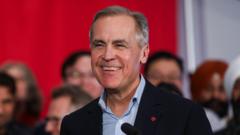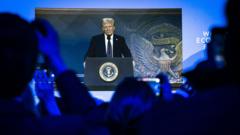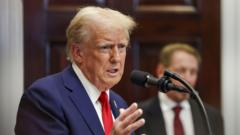With his promise to uplift the middle class now overshadowed by soaring prices for essentials, Canada's Prime Minister is at a crossroads as public discontent grows.
Canada's Political Shift: The Impact of Rising Living Costs

Canada's Political Shift: The Impact of Rising Living Costs
As Justin Trudeau faces political backlash, high living expenses spark frustration among voters nationwide.
In January 2025, the landscape of Canadian politics reflects a stark reality for Prime Minister Justin Trudeau, who ascended to power in 2015 with a compelling narrative centered around improving the lives of the middle class. Enthusiasts like Shivaan Burke, who once felt inspired enough to work for a local Liberal MP, now express disillusionment. Living in Peterborough, Ontario, a town that once benefited from an influx of Torontonians seeking affordable housing, locals now face an alarming spike in living costs.
Ms. Burke, a contract worker, symbolizes the frustration of many middle-class Canadians. Even as Trudeau's government touted progress, families like hers are grappling with the increased burden of groceries and housing prices that have surged dramatically across the country. "I feel financially paralyzed due to rising costs," lamented a respondent from a recent Royal Bank of Canada survey, reflecting a sentiment echoed by 55% of participants.
The culmination of these grievances illustrates a growing gap between political promises and the everyday struggles faced by Canadians, challenging Trudeau's grip on leadership as he prepares for a potential exit from office. As dissent builds, questions linger about the future direction of Canada's political landscape and the voices that will emerge to fill the void left behind.
Ms. Burke, a contract worker, symbolizes the frustration of many middle-class Canadians. Even as Trudeau's government touted progress, families like hers are grappling with the increased burden of groceries and housing prices that have surged dramatically across the country. "I feel financially paralyzed due to rising costs," lamented a respondent from a recent Royal Bank of Canada survey, reflecting a sentiment echoed by 55% of participants.
The culmination of these grievances illustrates a growing gap between political promises and the everyday struggles faced by Canadians, challenging Trudeau's grip on leadership as he prepares for a potential exit from office. As dissent builds, questions linger about the future direction of Canada's political landscape and the voices that will emerge to fill the void left behind.























